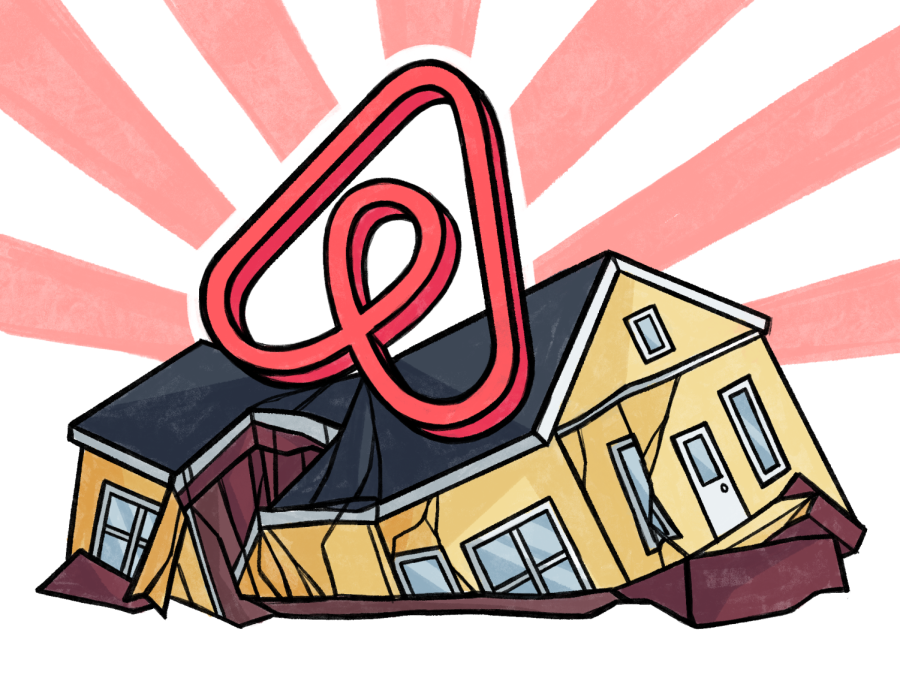OPINION: Airbnbs are detrimental to local cities and tourist areas
Airbnb create issues in rent prices, local communities and illegal renting.
Airbnb, founded in 2008, was created with the intent of allowing property owners to rent out their properties to others with ease. While marketed as a legal and easy way to rent out a property, it has had a negative impact on local cities and tourist regions, yet Airbnb refuses to recognize its issues that often lead to an increase in rent, changes in communities and illegal renting. The public’s failure to acknowledge these issues has led to many individuals booking Airbnbs and unknowingly raising rent in the areas they want to travel to.
Airbnb rentals have had a detrimental effect on communities they are hosted in. According to Professor Daniel Guttentag, an assistant professor in hospitality and tourism management at the College of Charleston, South Carolina, many locals often experience harassment, daily disruptions and rude tourists in areas where Airbnb rentals are prominent in neighborhoods. Locals may feel as if their neighborhood as a whole has changed, leading to a breach of comfort in communities to find a sense of belonging and social connection. For many cultures around the world, community is a valuable part of day-to-day life. But with Airbnb rentals spreading quickly across numerous countries, familiar faces become strangers.
Locals in many areas disapprove of Airbnb and the unfavorable traffic of tourists it brings. According to Airbnb Newsroom, nights booked in non-urban areas have increased in South Korea more than 180%, in India about 140% and Australia around 60%. While surges in tourists to small areas can benefit sales at local stores and small businesses, negative impacts on communities are outweighed by the effects of overtourism.
Airbnb can misrepresent the authentic portrayal of a destination and increases in travel can create issues with raising local prices and short-term rentals, causing housing shortages. Hitting record numbers of tourists is a sign of overconsumption in resources for small communities. Locals need to be prioritized over profits.
A prominent issue with Airbnb is that illegal renting is condoned. According to researchers David Wachsmuth and Alexander Weisler from McGill University, Airbnb has enabled hosts to earn two to three times as much as they normally would compared to renting out a property outside of Airbnb. In many places, such as Barcelona, short term restrictions were put into place and have made some Airbnb rentals illegal. The large sum of money granted, however, has encouraged many people to take advantage and illegally list their house on Airbnb to create profit.
Airbnb has not taken action about illegal listings. Hosts have been able to work around Airbnb’s restrictions and rules with their illegal listings lost in an ocean of 7 million listings worldwise. Illegal listings negatively affect housing markets in various areas, and going unseen by the company means the issue will persist to hurt many areas.
While Airbnb has brought forth beneficial changes, it has also offset rent prices. As more renters begin to list their houses on Airbnb for short-term renters, instead of renting out their houses to long-term renters, fewer places are able to be rented. Coupled with the high prices of Airbnb rentals relative to regular rent means rent prices will rise significantly. An increase in rental price can lead to many individuals having to leave and abandon the area they live in, negatively affecting the diversity of a community.
The best solution to these issues is for Airbnb to implement more restrictions on its hosting users, such as limiting the amount of Airbnb rentals allowed each month, capping the maximum amount of money a renter can list a house for and enforcing stricter action on the minimum and maximum amount of time tenants can stay. Although these changes may be difficult for Airbnb to implement, they are necessary in order to protect local communities.


